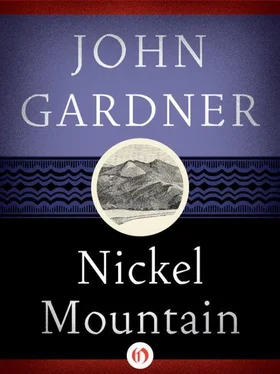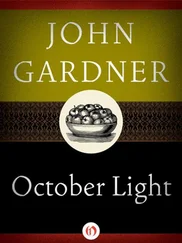He kept leaflets on his desk, tucked inconspicuously beside the register. No one ever took one. Sometimes when the spirit moved him — when he glimpsed in the eyes of some guest a flicker of humanity answerable to his own — Simon would timidly press one of the leaflets into the hand reaching out for keys. He would even sometimes venture a joke, though humor was perilous: “Here are your keys,” he would say, smiling horribly, like a man with some disease of the nervous system. When there was no work to do he would read, never any book but one. He would run his square, black fingertip along under the words and would move his lips, not merely because he was an ignorant man or only half-literate but also because he read with intense concentration. He read the Daily News in the same way, systematically, beginning with the front page and moving to the back, column by column, skipping nothing, even when he came to the advertisements or the two comics the Daily News carried, Major Hoople and Scorchy Smith. How much he understood of what he read, and in what queer mystical fashion he understood, God only knows. Since he never read the page four continuation of a front-page story until he happened to come to it in his methodical, column-by-column way, it seems unlikely that he read with intense curiosity. Nevertheless, he read his paper every day for some forty years, which is proof, at least, of the regularity of his habits, no mean virtue. His mouth would sometimes snap shut or twitch as he read — his obsequious smile had by this time become a nervous tic — and it seems very likely it twitched because Simon was angry, or, anyway, impatient. (One thinks of the way George Loomis used to read, twenty years younger than Simon was but more like Simon than either of them would have cared to admit. He too — late at night, in his big, lonely house — read column by column, except that he never bothered about the continuations or the advertisements or, above all, the comics — except for Scorchy Smith’s half-naked women — and all the time he read (his left leg balanced on his right knee, the paper on the leg, the thumb of his left and only hand flickering nervously at his cigarette) he would wince, outraged by all that hit his eye from the machinations of Democrats and Russians to the stupidity of typesetters. Compare, on the other hand, Henry Soames, reading when he had no customers to talk to at the Stop-Off. He would lay his paper out on a table — a cup of black coffee on the top left corner of the paper, tacking it down because of the breeze from the fan on the shelf in the corner — and he would spread his arms out to left and right to lean on the table as he bent his huge bulk toward the news, and he would glance over all the headlines, moving his up-tilted head like a man hunting for the piece he needed for a jigsaw puzzle, and he’d work out in his mind what he wanted to look into first. Then he’d start, and he’d go straight to the continuation, and sometimes he’d smile or he’d murmur “Hmm,” and sometimes he’d call, “Callie, listen to this!” and would read to her aloud (which Callie Soames hated). If world events were upsetting or baffling, he’d mention the trouble to every man that came into the diner or stopped for gas, and his premise, deeper than judgment, something in his blood by now, was that somehow even the most outrageous behavior of Russians or Democrats or the Farm Bureau must make some kind of reasonable, human sense. He’d work that sense out, eventually, finding good even in the most unthinkable points of view (very often by logic that only Henry and God could fathom, and frequently only God), and from then on Henry would be nearly as moved by pronouncements made from that point of view, however Henry might disagree, as a country woman would be by her “Search for Tomorrow” on TV. “You’re a damn fool,” George Loomis would say. “You forget the whole secret of human progress, pure meanness.” “I don’t believe there is such a thing as pure meanness,” Henry would say, “or pure anything else.” “Well you got to have faith in something,” George would say. As for old Doc Cathey (hunchbacked, sly, infernally testy), he never read the papers at all. He never read anything, in fact, and profoundly distrusted any man who did.)
When he finished at the Grant Hotel, at seven in the morning, Simon Bale would put on his old brownish coat and nod goodbye to Bill Hough, who clerked days, and go out to his old gray Chevy and drive himself the half-mile home to his black-shingle house just beyond the city limits. His wife would have his toast and eggs ready, and he’d eat his breakfast without a word, leaning far down over his plate and sliding in the food with his fork turned upside down, and then he’d shave himself with his electric razor and take off all but his underwear (loose jockey shorts and an undershirt with straps which he changed not more than once a month) and go to bed. He’d sleep five hours, then get up and go out on the porch with his Bible, and he’d sit there reading or meditating or dozing, or maybe watching crows making circles high above him, bringing to mind the circle in the fire, or he’d look at the mountain that rose up, awesome as Judgment Day, at the end of the valley, or at the oak tree in his yard. In August he would watch Ed Dart and his boys across the road combining wheat, which reminded Simon Bale of Christ, as did they, who were in a sense Plowmen, or Harvesters of the First Fruit, and he would smell the sweetness of the air, which bespoke in Simon’s hairy nostrils the boundless mercy of God. Around his yard there was a weathered snow fence and there were chickens in the yard, and in these too there were lessons. It was this way of seeing, above all, that made his mission hopeless. Going out on his calls on Sunday morning (his son, before the time of this story, sitting humble and surly in the car beside him, Simon himself a little on edge for lack of sleep), Simon might as well have talked ancient Hebrew to the people he called on. In a sense, he did.
One night, long after his daughter Sarah had run off (had married a Trail ways bus driver who’d gotten her pregnant, not without coaxing on her part, a girl of fifteen with the figure of a full-grown woman and a mind arrested at seven or eight, a face as long and blank as a cannister, given to hallucinations, pursued by demons, fond to the point of lunacy of charm bracelets, pins, brooches, anklets, dime-store rings) and a short while after his son Bradley had moved out to run, with monstrous tyranny, a household of his own, Simon Bale (his thin, brownish hair now beginning to turn gray around his ears) got a phone call at the Grant Hotel. Old Chester Kittle was there and saw it all. Simon stood very still, the Bible open on the counter, the dirty red ribbon dangling out over the edge, and the tic-smile came and went again and again, in shadow now, because the dim lamp over the desk stood diagonally behind him. He looked like a man being scolded harshly — for the leaflets on the counter, perhaps, or for a pious message left by some prankster on one of the old iron beds. No one would have thought it could be anything more; nothing of much significance could be expected to happen in the life of Simon Bale. But appearances fail us. Simon Bale’s house was on fire (someone had set it, but the troopers didn’t know that yet), and his wife was in the hospital probably dying. Simon hung up the telephone and turned to the Bible and hung onto it with both hands as if it was the only thing steady in the whole dark room. Still smiling — on, off, like a face in the funhouse at the county fair — Simon started to cry, a kind of howling noise that didn’t sound like crying or laughing either but was the kind of noise a hound might make, and old Chester jumped up and went over to him, his heart and brains in a turmoil.
Читать дальше











